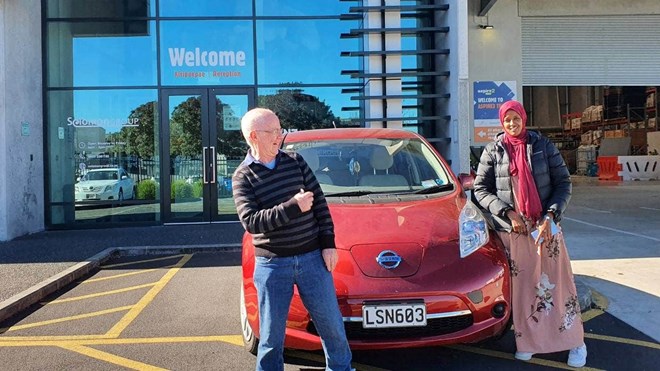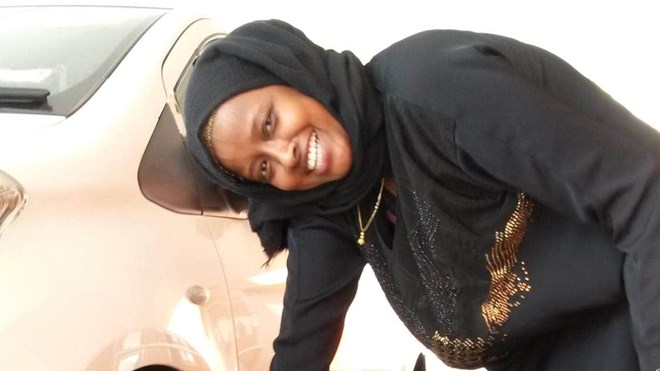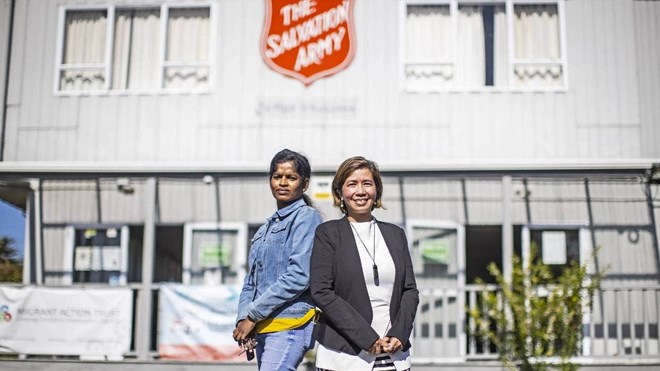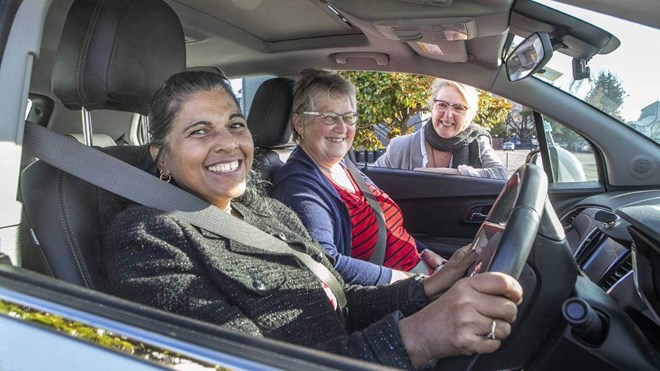
Monday May 23, 2022

Whatever age you are, living in a new country comes with
some daunting challenges – including driving. WEI SHAO talks to several
migrants about their efforts to get on the road and live a more independent
life in Aotearoa.
Amino Omar was told she would never learn to drive because
she was “deaf and dumb”.
But she knew they were wrong.
Getting her driving licence has meant “independence” for the
refugee from Somalia, single mum, and deaf person.
The 34-year-old moved to New Zealand with her daughter in
2009, and worked for five years to earn her licence.
“I saw my Somali friends driving around in their cars and
enjoying their freedom, but I was stuck at home by myself,” she said. “I felt
very lonely.”
“I had to walk to the supermarket and walk home again with
heavy bags. It was frustrating and exasperating seeing other people drive by,”
Omar says through interpreter Kevin McCready, a Kiwi friend who helped teach
her to drive.

Amino Omar took five years to gain her driving licence.
As well as being deaf, Omar has persistent language delay
because she never learned any language as a child.
She struggles with New Zealand Sign Language (NZSL), and it
takes her a lot of effort to concentrate.
“It makes my brain exhausted. I forget signs.”
She asked her Somali community for help to learn to drive,
but they wrote her off.
“They said I would never learn to drive. They said deaf
people can’t drive. But I knew they were wrong.”
It took her about three years to pass her theory test. She
attended lessons to learn the road code, and had a NZSL interpreter help her in
class.
“It took me a long, long time. I really wanted to achieve my
goal.”
Once she had her learner licence, she took more than 50
driving lessons to get the hang of being behind the wheel. Then Covid-19 put
the brakes on her effort to gain independence.
“During the first lockdown, I couldn't have any lessons. It
was a long time without driving, and I had to start learning all over again
after the lockdown.
“I even had trouble reverse parking, which was frustrating.”
She didn’t give up though, and took more lessons with
Puketapapa Community Driving School (PCDS). The school, run by Migrant Action
Trust, provides free lessons for refugees.
“They were really wonderful and helped me a lot,” she says,
adding they also taught McCready how to become a good driving teacher.
 Kegin Hoartens is a Sri Lankan refugee living in Auckland and being assisted to pass her driving test by the Migrant Action Trust in Sandringham. Pictured with trust manager Amie Maga.
Kegin Hoartens is a Sri Lankan refugee living in Auckland and being assisted to pass her driving test by the Migrant Action Trust in Sandringham. Pictured with trust manager Amie Maga.
Omar finally got her restricted licence in May 2021.
“Now I have much more independence. I can drive wherever I
want,” she said. “But I know I still need more experience.”
She was proud she was able to drive daughter and their
kitten to the emergency vet when the pet got sick. She could also take the
kitten to get vaccinations and a microchip.
“I am much happier now. It is a big life change.”
Rising demand for
driver training support
Amie Maga, the manager of PCDS and Migrant Action Trust,
says Omar’s success has been a big encouragement for other learners with
refugee backgrounds.
“Our learners face financial, literacy and language
barriers. Getting a licence means a world of difference for all of them.”
However, PCDS is struggling to keep its community driving
programme going due to a lack of funding.
“The demand for driver training support for migrants and
resettled communities is huge. But we get funding for only five driving lessons
per learner.
“It’s impossible for them to pass the driving test with only
five lessons.”
The Open Road Refugee Driver Training programme, funded by
the Ministry of Business, Innovation and Employment, is run by various
community organisations in nine locations around New Zealand.
They can support only 35 to 40 former refugees each year.
Since starting in 2016, 1134 learners have passed their
driving tests with help from the scheme, team leader Stefanie O’Briden says.
‘I have to drive, no
other choice’
Manal Dokhan used to drive in her home country of Jordan
before she moved to New Zealand with her husband, Mohsen Al-Harbi, in 2014.
He was killed in the March 15 terror attack in Christchurch
and Dokhan suffered two heart attacks in the days after the shootings.
“I started learning to drive in 2004. But with constant fear
and caution, my total dependence was on my husband,” she says.
“After my husband was killed in the mosque, the fear of
driving doubled ... I had never driven a car [in New Zealand] before.”
Without her husband, she had no choice but to learn to
drive. She cried when she needed to fill her car with petrol for the first
time.
After taking several lessons, she managed to pass a driving
test in 2020. Being able to drive has changed her life “completely” and made
her “stronger”.
“Don’t say, ‘I cannot do it’. Always try. You cannot ask for
help from others forever.
“I am so glad that I can give a ride to my mum, niece and
nephew wherever they want. I am glad I am a strong woman now.”

Learner driver Radha Kanta is mentored by Jean Little, as Salvation Army driver programme manager Keran Tsering watches on.
Radha Kanta, a 55-year-old Christchurch resident originally
from India, recently decided to pursue getting her driving licence.
She moved to New Zealand in 1988 and had taken lessons now
and then, but never got a full licence.
She spent her time looking after her children, volunteering
and travelling, but Covid changed her direction.
“I want to get a job and be more independent, and getting my
driver licence is a must.”
She has now had four driving lessons through the Salvation
Army’s driver programme, and aims to pass her test and land a job later this
year.
Mentor beside the
wheel
Jo Pelan became one of Open Road’s community mentors in
August 2020, and has since helped about 30 people, mostly women with a refugee
background, learn to drive.
Some of her students had never sat in a car, let alone the
driver seat, before.
“Some students did not know how to steer, just because
that’s something they never did before.
“For us, when we grow up, we ride bikes and play games with
steering wheels. We kind of take it for granted and think it is intuitive, but
not necessarily.”
Language can be another barrier.
“It is a bit tricky to give directions if the learner knows
little English, or has an interpreter on the back seat.”
For some women with refugee backgrounds, being able to drive
means “a whole different way of life”.
“These women are from different cultures where there are
lots of restrictions on them. They don’t have much freedom, and are not really
used to making decisions.
“But when they are driving, they have to constantly make
small decisions, like should I stop or go at the orange light. They sometimes
overthink.”
A huge gap for
migrant learners
Salvation Army driver programme manager Keran Tsering says
there is a huge gap in New Zealand's existing driving programmes.
“We’ve got a community driver mentor programme to support
locals who already have a NZ learner’s licence. We have a fast track full
licence programme to support a restricted licence holder to get their full.
“But for migrants with an overseas licence, they don’t fit
the criteria for either of them.”
The Salvation Army’s driver programme started in
Christchurch in 2014 and provides support to anyone having trouble getting a
licence.
“For migrants, refugees or anybody who is new to New
Zealand, they come to the country with differences in spatial awareness,
language barriers and road conditions.
“These are the barriers they face to become a safe driver.”
Helping break bad habits is also required for some migrant
drivers.
“In some countries ... they seem to have more traffic, and
people there drive very fast and zippy.”
New Zealand has one of the highest per capita car ownership
rates in the world. As of 2019, there were 818 light vehicles for every 1000
people.
But Waka Kotahi NZ Transport Agency statistics show it gets
harder to get a driving licence the older you are.
In 2021, nearly all (86 per cent) learner drivers aged 17
and under passed their full licence test. That dropped to 72 per cent for those
aged 30 to 40, and to just 58 per cent for those over 50.